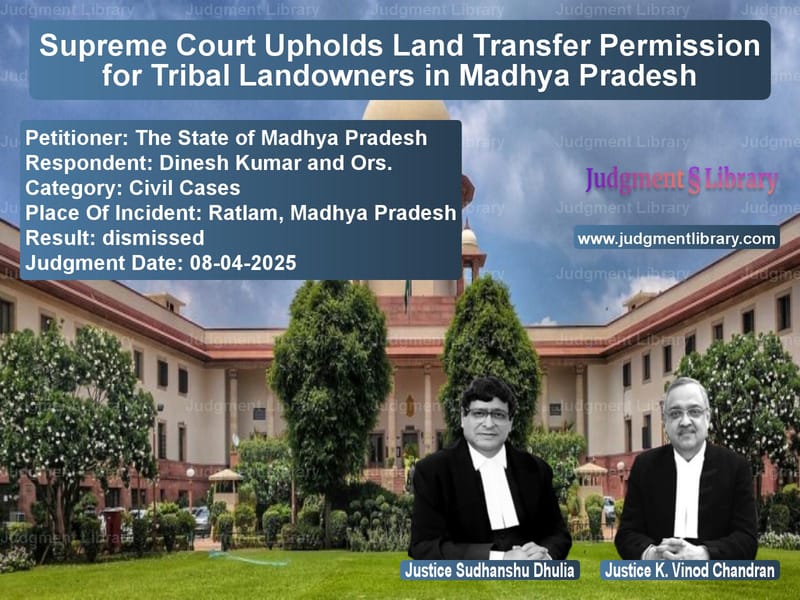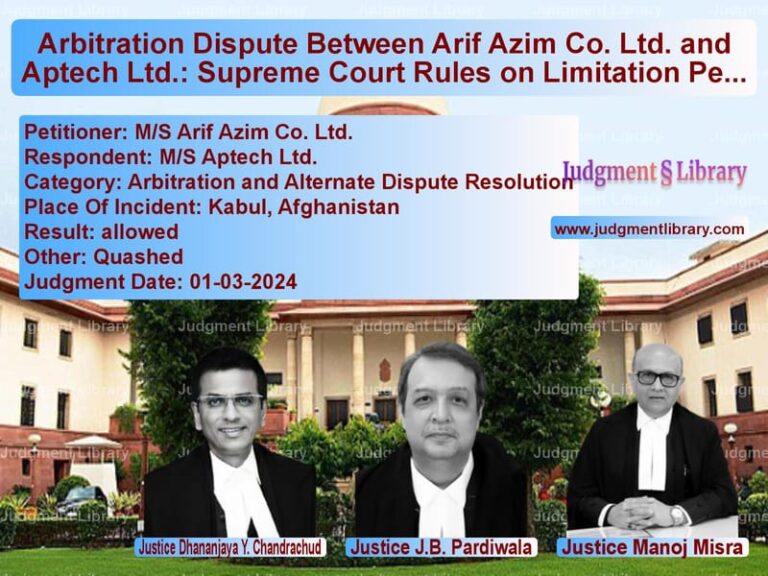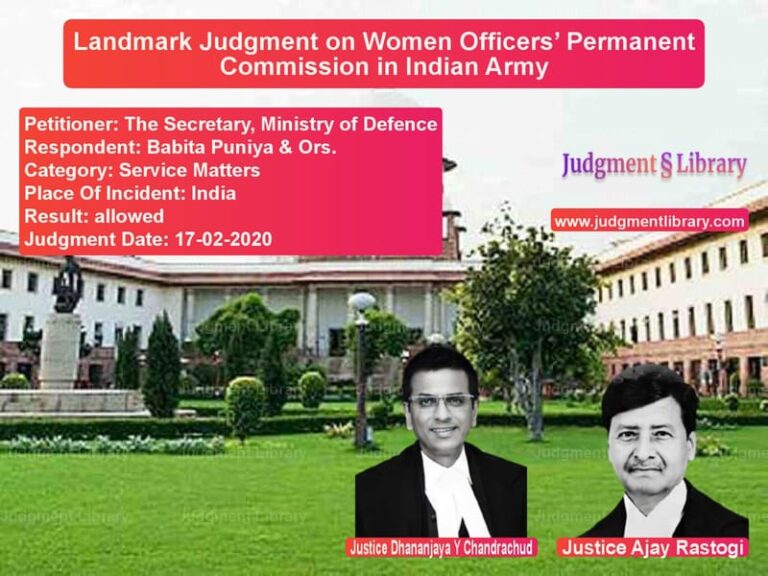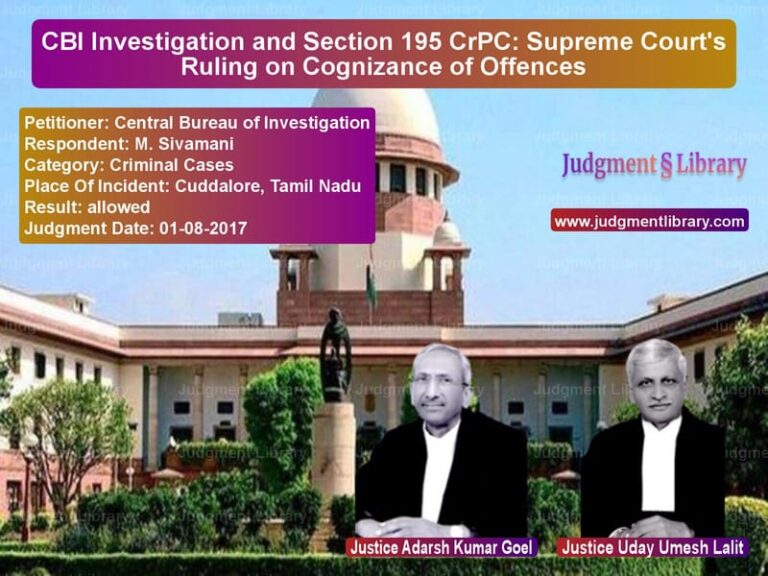Supreme Court Upholds Land Transfer Permission for Tribal Landowners in Madhya Pradesh
The Supreme Court of India recently delivered a significant judgment in the case of The State of Madhya Pradesh vs. Dinesh Kumar and Ors., addressing the legality of a land transfer involving tribal landowners in Ratlam district. The case revolved around the interpretation of Section 165 of the Madhya Pradesh Land Revenue Code, 1959, which regulates the transfer of land owned by indigenous tribes. Here’s a detailed breakdown of the case and the Court’s reasoning.
Background of the Case
The dispute arose when respondent Nos. 2 to 5, members of an indigenous tribe, sought permission to sell a portion of their land to respondent No. 1 (the Writ Petitioner). The Additional Collector, Ratlam, granted permission under Section 165(6)(ii) of the Code, allowing the sale. However, the Commissioner, Ujjain Division, later set aside this permission in a suo motu revision under Section 50 of the Code. The High Court of Madhya Pradesh at Indore subsequently reinstated the Additional Collector’s order, leading the State to appeal to the Supreme Court.
Key Arguments
Appellant’s (State of Madhya Pradesh) Arguments
- The Additional Collector lacked jurisdiction to grant permission under Section 165(6) as he was not specifically empowered to do so at the time.
- The permission was granted without proper consideration of the factors listed in Section 165(6-c), such as the purpose of the transfer and the adequacy of consideration.
- The Commissioner’s revisional order was valid as it corrected an erroneous decision by the Additional Collector.
Respondents’ (Dinesh Kumar and Ors.) Arguments
- The Additional Collector was authorized to exercise powers under the Code, as evidenced by Annexure R-1, a work allocation order dated 19.05.2017.
- The land in question was not located in a notified Scheduled Area, making Clause (i) of Section 165(6) inapplicable.
- The transaction was genuine, with the sale consideration exceeding the market value, and the landowners retained sufficient land for their needs.
Court’s Observations and Decision
The Supreme Court, in its judgment authored by Justices Sudhanshu Dhulia and K. Vinod Chandran, made the following key observations:
Jurisdiction of the Additional Collector
The Court noted that Section 11 of the Code explicitly includes Additional Collectors in the definition of Revenue Officers. Additionally, the work allocation order (Annexure R-1) confirmed that the Additional Collector was authorized to exercise powers under the Code. Thus, the State’s contention that the Additional Collector lacked jurisdiction was rejected.
Compliance with Section 165(6-c)
The Court examined whether the Additional Collector’s order complied with the requirements of Section 165(6-c), which mandates due regard for factors such as the purpose of the transfer and the adequacy of consideration. The Court observed:
“The order of the Additional Collector is produced as Annexure P-2 in the Writ Petition, wherein he refers to the various grounds stated in the application and the report secured by the Tehsildar from the Village Patwari on sixteen points to grant the permission sought for. It was also specifically noticed in the order that the purchaser, the respondent in the application, had undertaken that the land will be used for agricultural purposes. The market value of the land was found to be Rs.1,75,000/- per bigha, thus putting the total value at Rs.38,31,720/-; whereas the total consideration paid was Rs.45 lakhs, far in excess.”
The Court concluded that the Additional Collector had adequately considered all relevant factors, including the purpose of the transfer (agricultural use), the adequacy of consideration, and the absence of any sham or benami transaction.
Limitation on Suo Motu Revisional Powers
The Court referenced a Full Bench decision of the Madhya Pradesh High Court in Ranveer Singh v. State of M.P., which held that suo motu revisional powers under Section 50 must be exercised within 180 days of knowledge of the order. In this case, the Commissioner’s order was passed nearly three years after the Collector referred the matter, well beyond the permissible limit. The Court upheld the High Court’s finding that the revisional order was time-barred.
Final Decision
The Supreme Court dismissed the State’s appeal, affirming the High Court’s order. The Court held:
“We find that the Additional Collector had exercised the power under Section 165(6)(ii) properly and within his jurisdiction. The consideration leading to the grant of permission also have been dealt with by us; found to be perfectly in order. The exercise of the revisional power under Section 50 of the Code of 1959, according to us was erroneous and on a flawed understanding of the provisions in the Code of 1959.”
Conclusion
This judgment underscores the importance of adhering to statutory timelines for exercising revisional powers and clarifies the scope of authority of Additional Collectors under the Madhya Pradesh Land Revenue Code. It also highlights the protective measures for tribal landowners while ensuring their rights to transfer land are not unduly restricted.
Petitioner Name: The State of Madhya Pradesh.Respondent Name: Dinesh Kumar and Ors..Judgment By: Justice Sudhanshu Dhulia, Justice K. Vinod Chandran.Place Of Incident: Ratlam, Madhya Pradesh.Judgment Date: 08-04-2025.Result: dismissed.
Don’t miss out on the full details! Download the complete judgment in PDF format below and gain valuable insights instantly!
Download Judgment: the-state-of-madhya-vs-dinesh-kumar-and-ors-supreme-court-of-india-judgment-dated-08-04-2025.pdf
Directly Download Judgment: Directly download this Judgment
See all petitions in Property Disputes
See all petitions in Landlord-Tenant Disputes
See all petitions in Consumer Rights
See all petitions in Contract Disputes
See all petitions in Judgment by Sudhanshu Dhulia
See all petitions in Judgment by K. Vinod Chandran
See all petitions in dismissed
See all petitions in supreme court of India judgments April 2025
See all petitions in 2025 judgments
See all posts in Civil Cases Category
See all allowed petitions in Civil Cases Category
See all Dismissed petitions in Civil Cases Category
See all partially allowed petitions in Civil Cases Category







